A Quote by Jan Struther
Things happen too quickly, crisis follows crisis, the soil of our minds is perpetually disturbed. Each of us, to relieve his feelings, broadcasts his own running commentary on the preposterous and bewildering events of the hour: and this, nowadays, is what passes for conversation.
Related Quotes
Trust doesn't come haphazardly. It really has to be built over time. And that trust has to happen really at times when there isn't a crisis. That's why I think having regular meetings and conversation when there's no crisis, when you can build trust and a friendship and a relationship that allows for better dialogue and far more consequential deal-making can occur when a crisis does come up.
If we wish to know about a man, we ask 'what is his story--his real, inmost story?'--for each of us is a biography, a story. Each of us is a singular narrative, which is constructed, continually, unconsciously, by, through, and in us--through our perceptions, our feelings, our thoughts, our actions; and, not least, our discourse, our spoken narrations. Biologically, physiologically, we are not so different from each other; historically, as narratives--we are each of us unique.
Donald Trump is a president in crisis. His governing agenda is going nowhere, his credibility shattered with many, his public approval is mired in the thirties and low forties, and an escalating Russia crisis is threatening to undermine the president's ability to persuade even Republicans that he can bounce back.
Each individual composes the music of his own life. If he injures another, he brings disharmony. When his sphere is disturbed, he is disturbed himself, and there is a discord in the melody of his life. If he can quicken the feeling of another to joy or to gratitude, by that much he adds to his own life; he becomes himself by that much more alive. Whether conscious of it or not, his thought is affected for the better by the joy or gratitude of another, and his power and vitality increase thereby, and the music of his life grows more in harmony.
Debt, we've learned, is the match that lights the fire of every crisis. Every crisis has its own set of villains - pick your favorite: bankers, regulators, central bankers, politicians, overzealous consumers, credit rating agencies - but all require one similar ingredient to create a true crisis: too much leverage.
The concept of a midlife crisis is a well known one perpetuated by books and films. And recently the idea of a quarter-life crisis, between 20 and 30, has also gained a fair amount of media coverage. But there's a surprising lack of robust research on these events, and almost none on later life crisis.






































